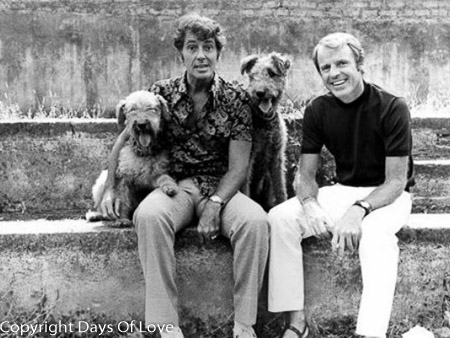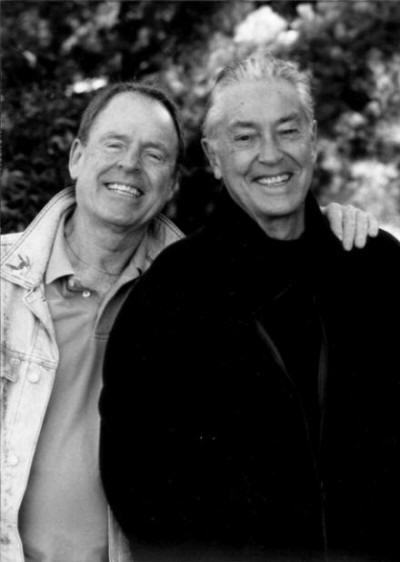 Farley Earle Granger Jr.[1]
(July 1, 1925 – March 27, 2011) was an American actor, best known for his two
collaborations with director Alfred Hitchcock: Rope in 1948 and
Strangers on a Train in 1951.
Farley Earle Granger Jr.[1]
(July 1, 1925 – March 27, 2011) was an American actor, best known for his two
collaborations with director Alfred Hitchcock: Rope in 1948 and
Strangers on a Train in 1951.Partner Arthur Laurents, James Mitchell, Robert Calhoun
Queer Places:
North Hollywood High School, 5231 Colfax Ave, North Hollywood, CA 91601, Stati Uniti
 Farley Earle Granger Jr.[1]
(July 1, 1925 – March 27, 2011) was an American actor, best known for his two
collaborations with director Alfred Hitchcock: Rope in 1948 and
Strangers on a Train in 1951.
Farley Earle Granger Jr.[1]
(July 1, 1925 – March 27, 2011) was an American actor, best known for his two
collaborations with director Alfred Hitchcock: Rope in 1948 and
Strangers on a Train in 1951.
Granger was first noticed in a small stage production in Hollywood by a Goldwyn casting director, and given a significant role in The North Star (1943), a controversial film praising the Soviet Union at the height of World War II, but later condemned for its political bias. Another war film, The Purple Heart, followed, before Granger's naval service in Honolulu, in a unit that arranged troop entertainment in the Pacific. Here he made useful contacts, including Bob Hope, Betty Grable and Rita Hayworth. It was also where he began exploring his bisexuality, which he said he never felt any need to conceal.
In a September 1944 Photoplay article depicting Granger in uniform, there's a quote from his mother insisting that her son was "a normal boy" who had lots of girlfriends. The reporter coyly points out that while that might be true, it was Roddy McDowall who was his "busom pal." A similar press treatment was given to John Dall, Granger's costar in Rope, a film written by Arthur Laurents in which they both played (subtextually) gay men. Dall had been married and divorced by the time his Hollywood career shifted into high gear. "It didn't last," he told reporter Gladys Hall. "Just one of those things. Just didn't work out, that's all. Once bitten, twice shy." But he added quickly: "Believe me, I think girls are here to stay. I'm extremely susceptible."
In 1948, Hitchcock cast him in Rope, a fictionalized account of the Leopold and Loeb murder case, which earned mixed reviews, but much critical praise for Granger. Hitchcock then cast him again in Strangers on a Train, as a tennis star drawn into a double murder plot by a wealthy psychopath, played by Robert Walker. Granger would describe this as his happiest film-making experience, and was deeply saddened by Walker's death shortly after shooting.



By the time Rope had begun filmin, Granger - known as "Farfel" to his friends - had entered a gay relationship of his own. He was living with Arthur Laurents, who was brought in to polish the script of Rope. Laurents and Granger had met on Laurents' first day in Hollywood and had flirted at Gene Kelly's house before cementing what was to be a four-year relationship. Samuel Goldwyn tried to discourage Granger's relationship with Laurents, whose gayness and left-wing politics made the producer uncomfortable. That didn't stop Granger and Laurents from setting up house together, however, although they were clearly cautious. Granger recalled being tempted to walk down the aisle with Janice Rule, with whom he lived for a time. "But something was saying, "Don't do this"," he remembered in 1996. "I'm glad I didn't."
In the 1950s, Laurents and Granger had split up, and Granger took up (at least temporarily) with a dancer, James Mitchell, who had played Dream Curly in the original production of Oklahoma!. Granger's next major film had him playing a handsome dandy with cruel ways, the abusive ballet master in the musical Hans Christian Anderson (1952). He raised star Danny Kaye's closeted ire and envy and was deprived of his only song because of it. Granger moved to New York in the mid 1950s and studied acting with Sanford Meisner, Stella Adler, and Lee Strasberg.
Despite his three unsuccessful Broadway experiences, Granger continued to focus on theater in the early 1960s. He accepted an invitation from Eva Le Gallienne to join her National Repertory Theatre. During their first season, while the company was in Philadelphia, John F. Kennedy was assassinated. The President had attended NRT's opening night and post-performance gala in the nation's capital, so the news hit everyone in the company especially hard. Granger had become a close friend of production supervisor Robert Calhoun, and although both had felt a mutual attraction, they never had discussed it. That night they became lovers.[36]
Granger continued to appear on stage, film and television well into his 70s. His work ranged from classical drama on Broadway to several Italian-language films and major documentaries about Hollywood. He tended to find fault with his directors and scriptwriters, however, and his career remains defined by the two Hitchcock films.
In 2007, Granger published the memoir Include Me Out, co-written with domestic partner Robert Calhoun (born 24 November 1930). In the book, named after one of Goldwyn's famous malapropisms, he freely discusses his career and personal life. Calhoun died of lung cancer in New York, New York on May 24, 2008, at age 77.[41]
Granger died of natural causes on March 27, 2011, at age 85.[42][43] He was cremated and his ashes given to family after a service at The Riverside restaurant.[44]
My published books: